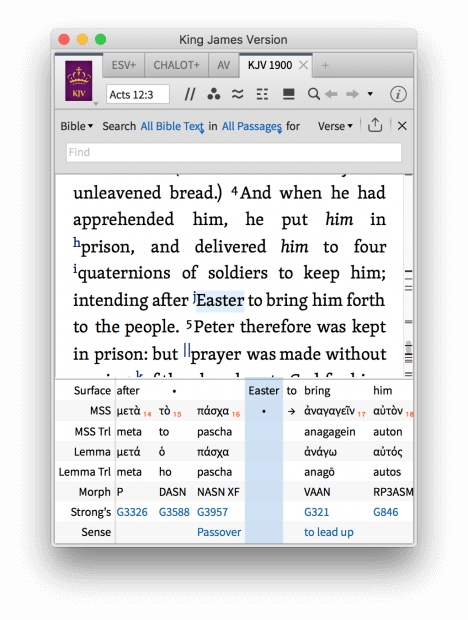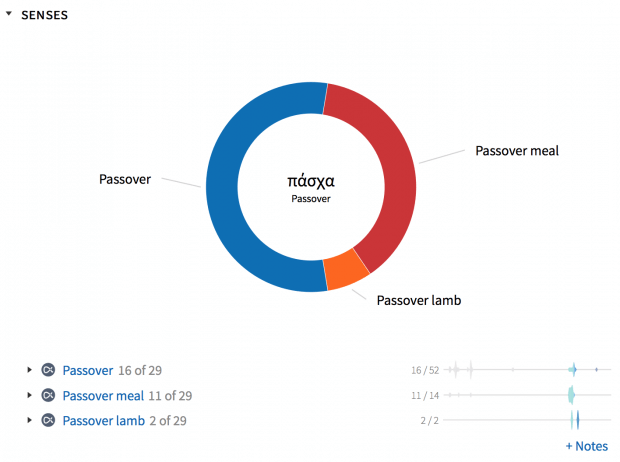Why is the most important Christian holiday not mentioned by name in the Bible?
Actually, the word “Easter” does appear in the Bible, but only once—and only in one translation. Among all major English translations of the Scripture, only the King James Version uses the word “Easter.” I won’t go into the history of that particular translation choice, but I will go into how to use the Logos Bible app to puzzle out what’s going on—even if you don’t know Greek. And I’ll explain why this important word doesn’t show up in other English translations.
If you search your Top Bibles in Logos for “Easter,” you get just one hit: KJV, Acts 12:4. But you, diligent student that you are, are probably wondering, “Did they really call it ‘Easter’ that early? Acts 12 is very early on in church history. What Greek word is this translating? Esteros or something?”
If you right-click on the word “Easter” in your KJV 1900 (the standard KJV edition in Logos packages), you’d get . . . nothing. There isn’t a Strong’s number attached to this word like there is for pretty much all the other words you’ve ever looked up.
Hmm . . . That’s odd. What is going on here?
So you try another method of figuring this out: you call up your reverse interlinear. Still nothing. Sort of:
Do you see that little dot in the highlighted column? That’s called a “null.” It means that “Easter” isn’t marked as a translation of anything in the Greek. It’s a bullet: •.
Did the KJV translators just stick “Easter” there randomly?
No: note that there’s another null—another “•” symbol—in the “Surface” (English text) row. That means there was a Greek word that the KJV translators left untranslated: pascha.
Aha . . . Now we’re getting somewhere. In fact, “Easter” is a translation, but the taggers here indicate that pascha in this context simply couldn’t mean “Easter,” so they were unwilling to tie the two together!
What you really want, if you want to get to the bottom of this, is to right-click on pascha in the interlinear ribbon and dig in a little further. Choose “Lemma” on the right, and then “Bible Word Study” on the left. You get links to dictionary definitions, a list of all the times the word gets used in the New Testament, and something really helpful within that list: the senses from the Bible Sense Lexicon.
Notice that the list of uses is divided into three at the bottom:
- Passover (which is the sense 16 of the 29 times this word appears in the NT)
- Passover meal (which is the sense 11 of 29 times)
- Passover lamb (2 of 29)
Click the arrows next to any of these senses, and you’ll see the places they appear in the NT. Whatever the reason the KJV translators chose “Easter,” the Bible Sense Lexicon is implying that it really isn’t one of the genuine senses of the word in the New Testament. The word means “passover” (or “passover meal,” or, twice, “passover lamb”).
The question, then, is whether or not the word in Acts 12 refers to a Christian celebration or a Jewish one. “Easter” is a Christian word, “Passover” a Jewish one. The text of Acts 12 makes it sound like it’s Herod “talking” when the word pascha is used:
When [Herod] had seized [Peter], he put him in prison, delivering him over to four squads of soldiers to guard him, intending after the [pascha] to bring him out to the people.
What does Easter mean?
If you use the Bible Word Study by clicking on the drop-down arrows, you’ll see that among the 29 uses of pascha in the New Testament, not one of them can clearly be used to speak of the Christian holiday of Easter. All but three of them are from the Gospels, anyway, before the Resurrection even occurred. The standard Greek-English lexicon says that “the Easter festival” is a sense of the word pascha that developed only “in later Christian usage.” It’s very unlikely that “Easter” was a thing when Luke wrote Acts. That’s why no translations but one use the word.
(Interestingly—language is so cool—the word “Easter,” like the word “east,” comes from a word that meant “dawn,” which always shows up in the east. The Resurrection is associated with a new dawning. Greek’s pascha is directly related to the Hebrew word for “pass over,” the word used to refer to what the angel of death did in Exodus 12 when he saw doorposts with lamb’s blood. He “passed over” those homes. Most languages derive their word for Easter from their word for Passover; English and German are the big exceptions.)
The Bible Sense Lexicon is a user-friendly way to dig into Greek terms even if you don’t know Greek. Handle with care, of course. But do handle. You could get yourself in an awkward situation if you adopt only one translation (be it the KJV or the NASB or the NIV) and 1) never check others or 2) never try to access the Greek and Hebrew through Logos. Does inspired Scripture say “Easter” or not? It’s an important question.
Prepare your heart for Easter
Now that we cleared that up, here’s an even bigger question: how are you preparing your heart for Easter? Take a look at our hand-picked selection of Easter resources—from quick-read booklets to more in-depth Mobile Education courses.
Related articles
- 5 Suggestions for Observing Good Friday
- The Triumphal Entry: The Pathway to Glory
- Did Jesus Go to Hell after He Died?
- Is Easter a Pagan Holiday? Some Say Yes—but Is It Really?
- Palm Sunday, and Why the ‘Date’ Is So Significant
Related resources
Raised on the Third Day: Defending the Historicity of the Resurrection of Jesus
Regular price: $23.99
Are You the One Who Is to Come? The Historical Jesus and the Messianic Question
Regular price: $23.99

The Final Days of Jesus: The Most Important Week of the Most Important Person Who Ever Lived
Regular price: $12.99









